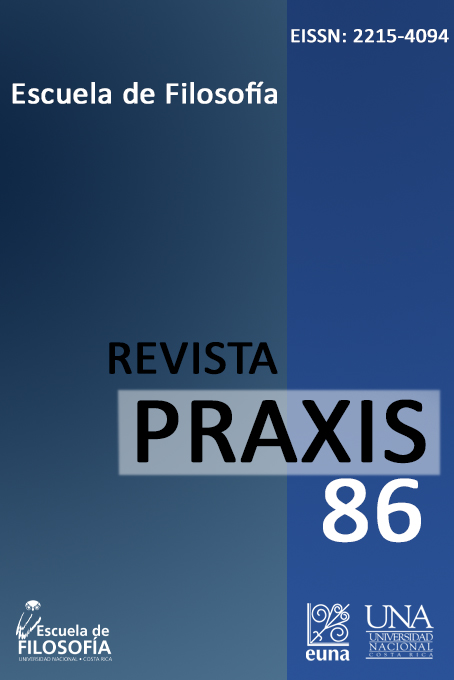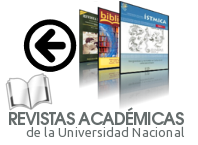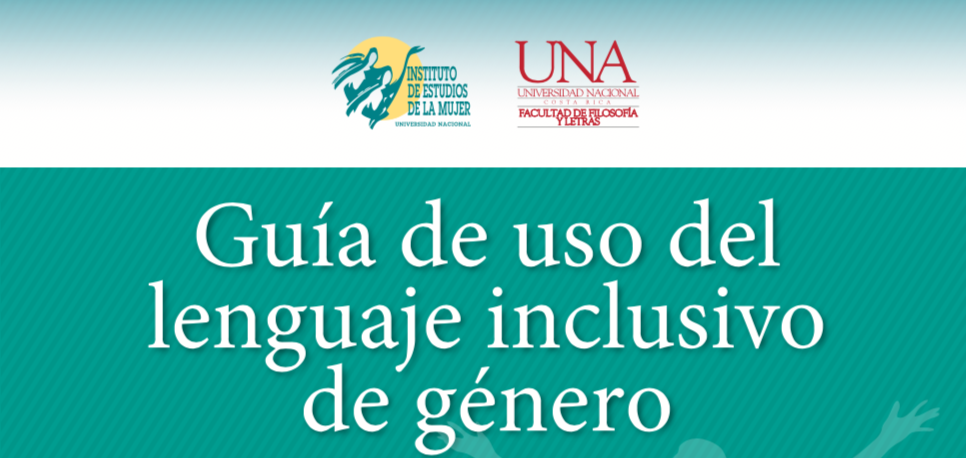Towards an ethics of spatiality
DOI:
https://doi.org/10.15359/praxis.86.7Keywords:
Deconstruction, dualism, ethics, immigration, spaceAbstract
From Jacques Derrida's deconstructive perspective, I am interested in identifying and rethinking some of the paradigms that mediate the forms of conceptualization of space. Particularly, I seek to identify how the Newtonian conception of space as a container survives, since colonial modernity, in the definition of territory and nation, having ethical and political effects in dealing with migrants and people in search of refuge. A philosophical, spatial, and ethical perspective on this would make it possible to criticize the idea of the container in which the relationship between territory, identity and nation continues to be imprisoned. I argue that it must be rethought by deconstructing the oppositions between being and appearance that underlie other disjunctions, among them, those of the interior/exterior or the body/soul dualism.
References
Alberti, L. B. (2010). De pictura. Éditions Allia.
Arendt, H. (2004). Los orígenes del totalitarismo (Trad. Guillermo Solana). Santillana.
Augé, M. (1992) Non-lieux. Introduction à une anthropologie de la surmodernité. Éditions du Seuil.
Bachelard, G. (2010). La poétique de l’espace. Quadrige, puf.
Bennett, J. (2010). Vibrant Matter: A Political Ecology of Things. Duke University Press.
Björkdahl, A., y Buckley-Zistel, S. (2016). Spatializing Peace and Conflict: An Introduction.” Spatializing Peace and Conflict: Mapping the Production of Places, Sites and Scales of Violence (pp. 1-22). Palgrave macmillan.
Blanc, N. y Grésillon, É. (2016). La géographie est-elle un art de l’espace? Géographies et cultures, 100, 47-61.
De Aquino, T. (2001). Cuestión 3. Sobre la simplicidad. Suma de teología (Ed. dirigida por los Regentes de Estudios de las Provincias Dominicanas en España, pp. 113-34). Biblioteca de Autores Cristianos.
Derrida, J. (1994). Force de loi. Galilée.
Derrida, J. (1997). Cosmopolites de tous les pays encore un effort! Galilée.
Derrida, J. (2015). Les arts de l’espace. Écrits et interventions sur l’architecture (Ed. Ginette Michaud y Joana Masó). Éditions de la différence.
Derrida, J. (2021). Hospitalité. Volume I. Séminaire (1995-1996). Seuil.
Descartes, R. (2011). Reglas para la dirección del espíritu (Trad. Luis Villoro, pp. 1-71). Obras. Gredos.
Descartes, R. (2011). Discurso del método. Obras (pp. 97- 152). Gredos.
Esposito, R. (2011). El dispositivo de la persona (Trad. Heber Cardoso) Amorrortu.
Floria, C. (1998). Pasiones nacionalistas. FCE.
Foucault, M. (1994). Dits et écrits IV, 1980-1988. Gallimard.
Foucault, M. (2000). Defender la sociedad. Fondo de Cultura Económica.
Gabriel, M. (2015). Por qué el mundo no existe. (Trad. Enrique G. de la G. Océano). ePub.
Herscher, A. (2020). Desplazamientos. Arquitectura y refugiados (Trad. Moisés Puente). Puente editores.
Hirst, P. (1993, Autumn). Foucault and Architecture. AA Files, 26, 52-60.
Husserl, E. (2008). La crisis de las ciencias europeas y la fenomenología trascendental (Trad. Julia V. Iribarne). Prometeo Libros.
Kaufmann, V., Bergman, M. M. y Dominique J. (2004). Motility: Mobility as capital. International Journal of Urban and Regional Research, 28(4), 745-756.
Lefebvre, H. (2000). La production de l’espace. Anthropos.
Massey, D. (1993). Power-Geometry and a Progressive Sense of Place. Mapping futures (Ed. John Bird, Barry Curtis, Tim Putnam, y Lisa Tickner, pp. 59-69). Routledge.
Massey, D. (2008). Conferencia en Cendes. Geometrías internacionales del poder y la política de una «ciudad global»: Pensamientos desde Londres. Cuadernos del CENDES, 25 (68), 115-122.
Massey, D. (2013). Espacio, lugar y política en la coyuntura actual. Urban, 7-12.
Nora, P. (1984). Entre Mémoire et Histoire. La problématique des lieux. Les lieux de mémoire, Tome I. La République (pp. XVII-XLII). Gallimard.
Platón. (1986). Diálogos III. Fedón, Banquete, Fedro. (Trad. Carlos García Gual, Luis Alberto de Cuenca y Prad y José Luis Navarro). Gredos.
Porter, R. (1996). Historia del cuerpo (Ed. Peter Burke, Trad. José Luis Gil Aristu). Formas de hacer Historia (pp. 255-286). Alianza Universidad.
Pratt, M. L. (2010). Ojos imperiales. Literatura de viajes y transculturación (Trad. Ofelia Castillo). Fondo de Cultura Económica.
Rama, Á. (1998). La ciudad letrada. Andes.
Rancière, J. (1996). Le concept d’anachronisme et la vérité de l’historien. L’Inactuel, (6), 53-68.
Ravasio, P. (2020). Este tren no está destinado a la gloria. Un estudio de ferropaisajes literarios (Trad. Erika Abril). Kipu-Verlag.
Ruberg, W. (2020). History of the Body. Macmillan international.
Salazar Araya, S. (2019). Las caravanas migrantes como estrategias de movilidad. Revista de Ciencias Sociales de la Universidad Iberoamericana, 14(27), 111-144.
Sekula, A. (1986). The Body and the Archive. October, 39, 3-64.
Soja, Edward W. (2010). Building a Spatial Theory of Justice. Seeking Spatial Justice (pp. 67-110). University of Minnesota Press.
Surrallés, Alexandre. (2010). La retórica de traducir cuerpo. Retóricas del cuerpo amerindio, editado por Manuel Gutiérrez Estévez y Pedro Pitarch (pp. 57-86). Iberoamericana, Vervuert.
Waldenfels, B. (2015). Habitar corporalmente en el espacio. Exploraciones fenomenológicas acerca de lo extraño (Coord. Gustavo Leyva). Anthropos Editorial.
Warf, Barney y Arias, Santa. (2009). Introduction: the reinsertion of space in the humanities and social sciences. The spatial turn: Interdisciplinary perspectives (pp. 1-10). Routledge.
Downloads
Additional Files
Published
How to Cite
Issue
Section
License
La revista trabaja bajo la Licencia Creative Commons Atribución-NoComercial-CompartirIgual 4.0 Internacional; apartir de la publicación número 79 (2019); en publicaciones anteriores se trabajaba bajo una Licencia Atribución- No Comercial- Sin Derivadas 4.0 Internacional.








